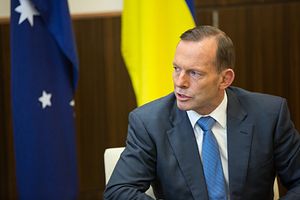What a difference a year can make. The government’s first budget last year was a controversial, near austere thing with deep cuts to science, foreign aid and welfare along with deregulation of the tertiary education system, potentially making degrees far more expensive. This year it is the less exciting document that Tony Abbott has been promising. It’s main focus and the way it is being sold is domestic: farmers, families, small business. In other words, the key constituencies of the ruling Coalition. If a budget must always be a mix of political and economic then this one skews far to the political side of the spectrum, designed to save the government after a very rocky first eighteen months in office.
It is, as economic editor of The Australian Judith Sloan has said, trying to present a “credible path back to surplus,” while it also doesn’t scrimp so much on spending. There are plenty of tax breaks for small businesses but multinationals are also being targeted for tax evasion. The public is not happy about a Netflix tax. The streaming service has been so unexpectedly popular that internet speed in the country has slowed as a result.
In times of stress , which this government suggests Australia is suffering thanks to the deficit and the “mess” left by Labor (something the government still harps on about some 18 months later), policy and politics tend to look inward. Thus cuts to foreign aid are not entirely surprising, though the details are worth examining given it does seem to signal something of a regional re-focus even as domestic and international anti-terror work is stepped up (and increasingly cashed up).
Aid in total this budget will be A$4 billion ($3.24 billion) in overseas development assistance (ODA), though A$3.7 billion will be cut over the coming three financial years. Australia’s foreign aid budget has already seen some of the deepest cuts ever in last year’s budget and in the Mid Year Economic and Fiscal Outlook (MYEFO) which followed.
Aid to Indonesia is to be cut by by close to half, from A$605 million to A$366 million. Though Tony Abbott had said after the execution of Australian nationals Andrew Chan and Myuran Sukumaran that the relationship with Indonesia could not be “business as usual,” it’s been pointed out that many of the projects funded after the Boxing Day tsunami were to expire at this time. Mr Abbott may have made a tactless misstep in asking Indonesia to remember that aid before it executed the two men but it seems unlikely that 40 percent of Indonesia’s aid budget has been cut in retaliation.
These aren’t the only aid cuts: aid to African nations will drop by 70 percent, despite pleading by several ambassadors to the Joint Standing Committee on Foreign Affairs, Defence and Trade last year. Australia’s actual contributions to Africa are, however, relatively low and apparently take the form of scholarships and the like.
Vietnam and the Philippines will also see their Australian ODA drop. Neighboring Cambodia will not, but Cambodia, like Nauru, is holding and resettling asylum seekers who were bound for Australia. Papua New Guinea will see a small drop of five percent. CARE Australia’s aid budget has been cut by the same amount as has World Vision; monies to some UN bodies will drop by significantly more. PNG remains the largest beneficiary of Australian aid.
Meanwhile Australia is opening new missions in Thailand, Qatar, PNG, Indonesia and Mongolia at a cost of A$98.3 million. This will advance trade and provide consular assistance (though presumably not to those want to do stupid things). Abbott has also, earlier, said that Australia would focus its efforts more in the Indo-Pacific, which according to most current thinking on the strategic importance of aid makes sense. Karl Claxton of the Australian Strategic Policy Institute (ASPI) made this point in a piece for The Australian last month. World Vision Australia CEO Tim Costello said roughly the same thing last year when aid cuts were announced, pointing out that any scaling back of aid in the region may weaken it longer term, leaving it open to more problems and possible instability.
And regarding instability: another A$450 million will go toward national security measures, after last year’s tranche that included the then-confusing metadata retention laws. Finally there has been some indication of how ISPs are to store all citizens’ metadata for two years: The government will not expect business to pick up the tab for public policy but provide A$131 million to upgrade services. Another A$750 million will go to military operations in Afghanistan, Iraq and the Middle East with A$382 million of that to go directly towards “efforts to disrupt, degrade and ultimately destroy Daesh, also known as ISIL.” (not “death cult,” it seems). A Defence White Paper will also be delivered this year.
As regards asylum seekers, more than A$70 million will go towards Ocean Shield, to patrol Australian waters and stop boat arrivals. In another ocean, Australia will spend A$50 million more to find the missing Malaysia Airlines flight, after its A$43.9 million spent last year.
Is Abbott right, is it just a boring budget? Not entirely, but it is designed to at least be softer at home, though possibly tougher abroad.
Helen Clark was based in Hanoi for six years as a reporter and magazine editor. She has written for two dozen publications including The Diplomat (as Bridget O’Flaherty), Time, The Economist, the Asia Times Online and the Australian Associated Press.

































